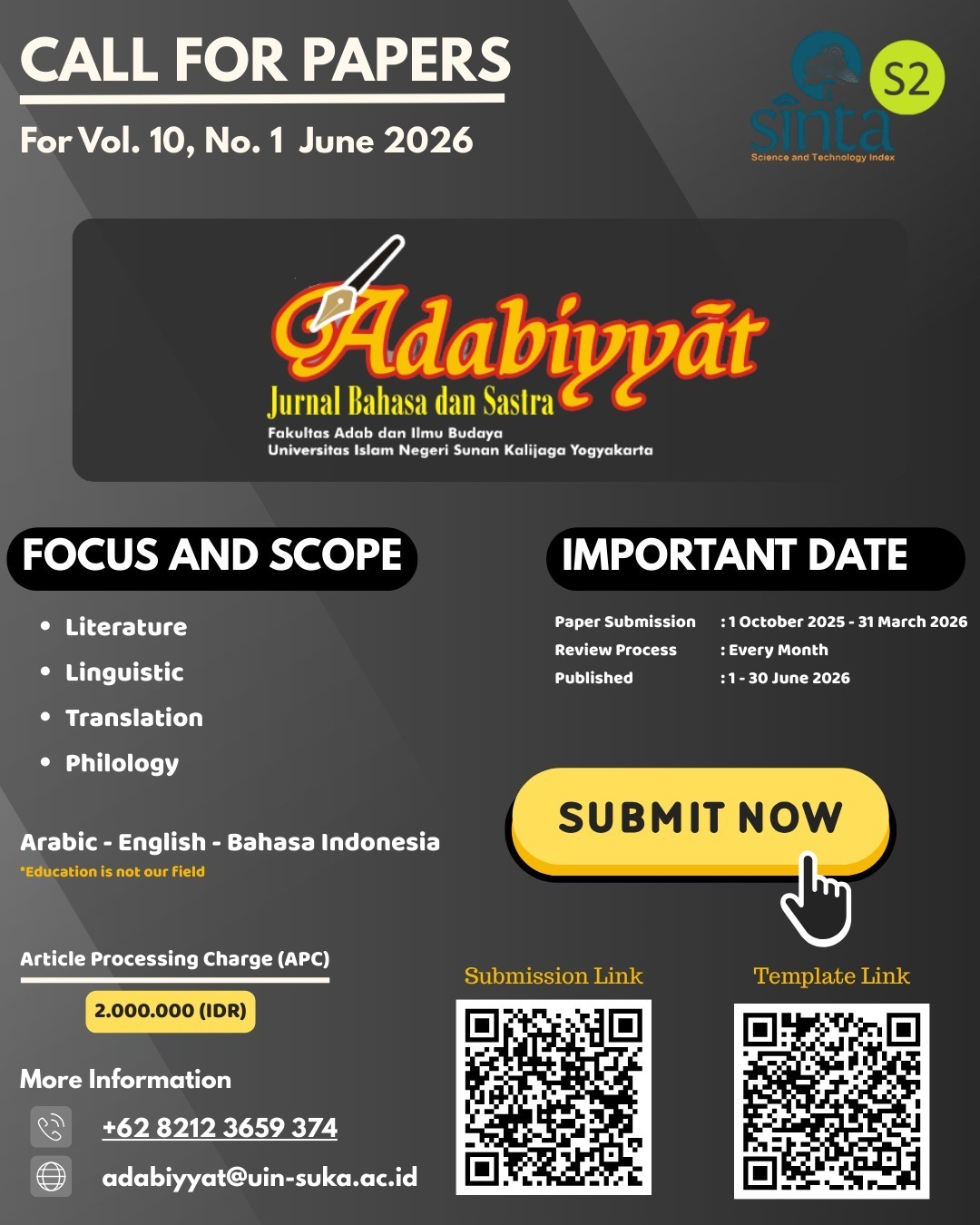RESEPSI SASTRA NOVEL SARAH KARYA ‘ABBAS MAHMUD AL-‘AQQAD
DOI:
https://doi.org/10.14421/ajbs.2013.12110Abstract
Sarah’s novel is a unique masterpiece of an author dubbed as Imlaq al-'Arab (The Giant), ‘Abbas Mahmud al-‘Aqqad. This novel is unique because it is the only of his work written in the form of novels among his works. It's pretty awesome because al-'Aqqad has written about 83 books in various fields of science and 10 anthologies of poetries. The presence of this novel provokes some responses of various groups of litterateurs, writers, and readers, either a positive or a negative response, particularly when it is associated with al-‘Aqqad’s side of life as well as the condition of society in his time of life. To review this novel, the author uses the Reception Theory in Literature. The theory emphasizes the reader's reception of a literary text as an important factor in the interpretation of literature. In fact, the reader as interpreter presents diversity of meaning in accordance with the Horizon of Expectations as Hans Robert Jauss said. In addition, the diversity of reader reception is also based on characters of literature itself. It always presents 'open plek' according to Walfgang Iser. It will be filled and solidified differently by the readers. The method used is the Critical Approach that aims to discuss the reception developments of review, criticism, commentary, analysis, or other forms of research such as graduating papers, theses, and dissertations. Reader’s reception toward the novel of Sarah published in1964 up to 2005 shows on three receptions feature. First, the novel is supposed as a novel presenting the women's psychological analysis. Second, Sa>rah novel is as an autobiographical novel that describes the author's love story. Third, Sarah novel is a realist novel depicting the reality of class conflict and describing the attitude of women leaders and scholars of Egypt in facing of modernization.
Downloads
References
‘Amir, Al-‘Aqqad. 1970. Al-Mar'ah Zalik al-Lagz. Bairut: Dar-Kitab al-‘Arabi.
‘Abdullah, Sufi. 1976. Hawau wa Arba'ah 'Amaliqahu fi Daui> A‘malihim al-Adabiyyah, al-‘Aqqad, Taha Husain, Taufiq al- Hakim, Najib Mahfuz. Kairo: al-Hai'ah al-Misriyyah al-‘Ammah li al-Kitab.
‘Abdullah, Abdu al-Badi’. 1990. Dirasah fi al-Riwayah al-‘Arabiyyah al-Mu’>sirah. Kairo: Maktabah al-Adab.
‘Abdullah, Muhammad Hasan. 2005. Al-Waqi’iyyah fi al-Riwayah al-‘Arabiyyah. Kairo: Hai’ah al-Misriyyah al-‘Amah li al-Kitab.
Al-‘Aqqad, ‘Abbas Mahmud. t.t. Sarah. T.tp.: Dar al-Hilal.
Al-‘Aqqad, ‘Abbas Mahmud. 1943. Al-Siddiqah binti al-Siddiq. T.Tp: T.tt.
Al-‘Aqqad, ‘Abbas Mahmud. 1969. Al-Mar'ah fi al-Qur'an al-Karim. Bairut: Dar al-Kitab al-‘Arabi.
Al-‘Aqqad, ‘Abbas Mahmud. T.t. Haihi al-Syajarah wa al-Insan al-S|a>ni>. Fujalah: Maktabah Garib.
Al-‘Asri, Jalal. 1994. Al-‘Aqqad wa al-‘Aqqadiyyah. Kairo: Dar al-Mis}riyyah al-Lubnaniyyah.
Al-Baqari, Ahmad Mahir. 1984. Al-‘Aqqad al-Rajul wa al-Qalam. Kairo: Dar-al Ma‘arif.
Al-Didi, ‘Abdu al-Fattah. 1965. ‘Abqariyah al-‘Aqqad. Kairo: al-Dar al-Qaumiyyah li al-Taba‘ah wa al-Nasyr.
Al-Sa‘dawi, Nawal. 2001. Perempuan dalam Budaya Patriarki. Terj. Zulhilmiyasri. Yogyakarta: Pustaka Pelajar.
Al-Syamari, Hamd Nayif. 1400 H. Al-‘Aqqad wa Turasuhu al-Islami Kairo: Makatabah Taqaddum.
Al-Tuniji, Muhammad. 1993. al-Mu’jam al-Mufassil fi al-Adab, Juz II. Bairut: Dar al-Kutub al-‘Ilmiyyah.
Al-Wakil, Al-‘Audi. 1971. Al-‘Aqqad wa al-Tajdid fi al-Syi’r. Kairo: Mat}ba’ah al-Ma’rifah.
Badr, ‘Abd al-Muhsin Taha. T.t. Tatawwur al-Riwayah al-‘Arabiyyah al-Hadisah fi Misr (1870-1938). Kairo: Dar al-Ma’arif.
Culler, Jonathan. 1981. The Purduit of Sign: Semiotic, Literature and Decontruction. London and Henley: Rutledge and Kegan Paul.
Fuad, Ni‘mat Ahmad. 1983. al-Jamal wa al-Huriyyah wa al-Syakhsiyyah al-Insaniyyah fi al-Adab al-‘Aqqad. Kairo: Dar al-Ma‘arif.
Iser, Walfgang. 1978. The Act of Reading, A Theory of Aesthetic Response. London: The Jhon Hopkins Press.
Jaudah, Suraya Abdu al-Mun‘im. T.t. Dirasah Tarikhiyyah wa al-Fanniyyah fi al-Maqalah wa al-Qissah al-Masrahiyyah. Kairo: Jami’ah al-Azhar.
Jauss, Hans Robert. 1983. Toward an Aesthetic of Reception, terj. Timothy Bahty, Minneapollis: University of Minnesota Press.
Karim, Samih. 1978. Maza Yabqa min al-‘Aqqa>d. Kairo: al-Hai'ah al-Misriyah al-‘Amah li al-Kitab.
Musa, Ra'uf Salamah. 2002. Al-‘Aqqad. Iskandariyyah: D>r wa Matabi‘ al-Mustaqbal.
Nassar, ‘Ismat. 2004. al-Fikr al-Misri al-Hadis, baina al-Naqd wa al-Naqd. Kairo: Maktabah al-Misriyyah.
Pradopo, Rachmat Djoko. 2003. Beberapa Teori Sastra, Metode Kritik dan Penerapannya. Yogyakarta: Pustaka Pelajar.
Ratna, Nyoman Kutha. 2004. Teori, Metode, dan teknik Penelitian Sastra dari Strukturalisme hingga Postrukturalisme. Jogjakarta: Pustaka Pelajar.
Riffaterre, Michael. 1978. Semiotics of Poetry. Bloomington and London: Indiana University Press.
Sangidu. 2005. Penelitian Sastra, Pendekatan, Teori,Metode,Tehnik dan Kiat. Yogyakarta: Seksi Penerbitan Sastra Asia Barat, Fakultas Ilmu Budaya Universitas Gajah Mada.
Syalabi, Amin. 2000. Al-Garb fi Kitabat al-Mufaqqirin al-Misriyyin. Kairo: Dar al-Hilal.
Teeuw. 1984. Sastra dan Ilmu Sastra, Pengantar Teori Sastra. Jakarta: Pustaka Jaya.
‘Umri, Zaenab ‘Abd al-‘Aziz. T.t. Syi’r al-‘Aqqad. Kairo: Maktabah Syabab.
'Uwaidah, Kamil Muhammad Muhammad. 1994. ‘Abbas Mahmud al-‘Aqqad, Qatrah min Bahri Adabihi. Bairut: Dar al-Maktab al-‘Ilmiyyah.
Wadi, Taha. 1994. Surah al-Mar’ah fi al-Riwayah al-Mu’asrah. Kairo: Dar al-Ma’arif.
Downloads
Published
Issue
Section
License
- Adabiyyāt: Jurnal Bahasa dan Sastra publishes all articles entirely in full text.
- It is permissible for readers to download and to use it for scientific purposes and scientific dissemination.
- The author can re-publish the article that has been published by the Adabiyyāt: Jurnal Bahasa dan Sastra after obtaining written permission from the editor. This letter can be obtained by submitting a request letter for permission to republish the article to Adabiyyāt: Jurnal Bahasa dan Sastra via email adabiyyat@uin-suka.ac.id. In the second publication, the author is required to include information that the article was firstly published by the Adabiyyāt: Jurnal Bahasa dan Sastra.









